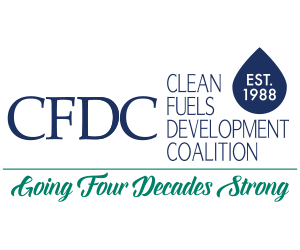“The Administration’s decision to issue Renewable Fuel Standard waivers and therefore remove low-carbon, low-toxin biofuels is a significant step backwards and damaging to our environment and public health. Studies show that higher blends of biofuels in gasoline can reduce air pollution and greenhouse gas pollution and save Americans money at the pump. Yet, again the EPA is choosing to side with the oil industry at the expense of the health and well-being of the American people.” ~ Doug Durante, Executive Director of Clean Fuels Development Coalition
Late Friday, the U.S. Environmental Protection Agency (EPA) announced it will issue waivers allowing oil refiners to disregard requirements to blend renewable biofuels into gasoline per the Renewable Fuels Standard—a regulation that is aimed at increasing the use of biofuels to create low-carbon, low-toxic gasoline. The EPA’s decision is bad for the environment and public health.
These waivers will remove low-carbon, low-toxic biofuels and be replaced by petroleum compounds including benzene and benzene derive additives—a proven human carcinogen. In 1948, The American Petroleum Institute stated that “it is generally considered that the only absolutely safe concentration for benzene is zero.” Yet, benzene or benzene-ringed compounds still make up over 25 percent of the gasoline sold in the U.S.
Equally as concerning, petroleum derived octane additives are extremely energy intensive to produce and yield increased carbon dioxide emissions—therefore contributing to an uptick in greenhouse gases. As part of the Clean Air Act, the EPA itself found that emissions of greenhouse gases from motor vehicles contribute to the greenhouse gas pollution which threatens public health and welfare.
These actions also go directly against the goals of The Safer Affordable Fuel-Efficient (SAFE) Vehicles Rule—which aims to decrease tailpipe carbon emissions and increase the use of safer, cleaner and more efficient vehicles.
Research shows that higher blends of ethanol in gasoline not only make gasoline safer, but also decrease carbon and greenhouse gas emissions while saving consumers money. In fact, studies by Ford and others have determined that a premium high octane fuel made with ethanol would allow them to increase fuel efficiency and reduce tailpipe carbon emissions by seven percent.
To learn more, read the Gasolinegate report and visit the Safe Gasoline Campaign.
To take action, sign a petition calling on the EPA to make gasoline safer at www.change.org.
